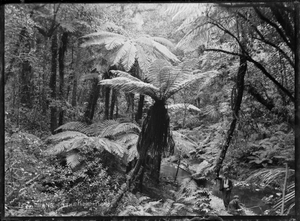Korokoro, New Zealand
Suburb of Lower Hutt, New Zealand From Wikipedia, the free encyclopedia
Suburb of Lower Hutt, New Zealand From Wikipedia, the free encyclopedia
Korokoro, a suburb of Lower Hutt City, lies in the south of the North Island of New Zealand. The suburb occupies part of the western hills of the Hutt Valley; its eastern slopes overlook Petone and the Wellington harbour.
Korokoro | |
|---|---|
 Native bush with tree ferns, a stream, and two men in right foreground, at Korokoro | |
 | |
| Coordinates: 41.215°S 174.869°E | |
| Country | New Zealand |
| City | Lower Hutt |
| Local authority | Hutt City Council |
| Electoral ward | Harbour |
| Community board | Petone Community Board[1] |
| Established | 1900s |
| Area | |
| • Land | 185 ha (457 acres) |
| Population (June 2024)[2] | |
| • Total | 1,630 |
Korokoro was established in the 1900s by the Liberal government (in office 1891–1912), and remained a relatively small settlement until the Lower Hutt City Council developed the area for private housing in the 1960s.[3][failed verification] Before 1989, Korokoro formed part of the Petone Borough,[4] which amalgamated with Lower Hutt City in that year.[5]
Korokoro statistical area covers 1.85 km2 (0.71 sq mi).[6] It had an estimated population of 1,630 as of June 2024,[2] with a population density of 881 people per km2.
| Year | Pop. | ±% p.a. |
|---|---|---|
| 2006 | 1,284 | — |
| 2013 | 1,329 | +0.49% |
| 2018 | 1,482 | +2.20% |
| Source: [7] | ||
Korokoro had a population of 1,482 at the 2018 New Zealand census, an increase of 153 people (11.5%) since the 2013 census, and an increase of 198 people (15.4%) since the 2006 census. There were 540 households, comprising 744 males and 741 females, giving a sex ratio of 1.0 males per female. The median age was 37.9 years (compared with 37.4 years nationally), with 315 people (21.3%) aged under 15 years, 225 (15.2%) aged 15 to 29, 795 (53.6%) aged 30 to 64, and 147 (9.9%) aged 65 or older.
Ethnicities were 85.6% European/Pākehā, 10.9% Māori, 2.0% Pasifika, 10.9% Asian, and 3.0% other ethnicities. People may identify with more than one ethnicity.
The percentage of people born overseas was 24.3, compared with 27.1% nationally.
Although some people chose not to answer the census's question about religious affiliation, 58.5% had no religion, 30.2% were Christian, 0.2% had Māori religious beliefs, 1.2% were Hindu, 0.4% were Muslim, 0.6% were Buddhist and 1.8% had other religions.
Of those at least 15 years old, 501 (42.9%) people had a bachelor's or higher degree, and 87 (7.5%) people had no formal qualifications. The median income was $52,700, compared with $31,800 nationally. 435 people (37.3%) earned over $70,000 compared to 17.2% nationally. The employment status of those at least 15 was that 729 (62.5%) people were employed full-time, 150 (12.9%) were part-time, and 45 (3.9%) were unemployed.[7]
Korokoro School is a co-educational state primary school for Year 1 to 8 students,[8][9] with a roll of 213 as of August 2024.[10] The school opened in 1904.[11]
Seamless Wikipedia browsing. On steroids.
Every time you click a link to Wikipedia, Wiktionary or Wikiquote in your browser's search results, it will show the modern Wikiwand interface.
Wikiwand extension is a five stars, simple, with minimum permission required to keep your browsing private, safe and transparent.